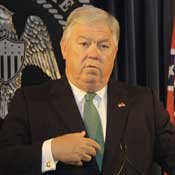Gov. Haley Barbour warned the state yesterday that the typically languid waters of the Mississippi River could crest the middle of next month at 53.5 feet in Vicksburg, 10.5 feet above flood stage and one and one-half foot higher than the 52-foot crest the river reached in 2008. The news spells trouble for people living near the river in the Delta and Vicksburg area who suffered flooding in 2008. The river stage at Greenville and Natchez could crest at 60 feet, 12 feet above flood stage.
"This is one disaster we can prepare for ahead of time," Barbour stated in a press release. "Anyone living or owning property in the affected area needs to take this situation seriously and move any property to higher ground."
Vicksburg Mayor Paul Winfield held a "Flood Preparation" press conference yesterday at the Vicksburg flood wall near the corner of Clay and Levee streets. The purpose of this discussion, the mayor said, was to inform the public of the "impending historic flood" on its way to Vicksburg.
AccuWeather.com Senior Meteorologist Alex Sosnowski reported today that the swelling Mississippi is the result of a record amount of rain in the Mississippi River basin further north, with rising water levels expected to top levels set as far back as in 1937. Sosnowski reported that the number of evacuees along the swollen Ohio River and Mississippi River in those northern territories currently amount to a few hundred, but "could soon number in the tens of thousands as levees are topped or breached."
The rain brought with it a flurry of tornados that have killed nearly 300 people across the South this week, including 33 in Mississippi. The town of Smithville, just southeast of Tupelo, is largely gone.
Despite the big numbers, Assistant State Climatologist Michael Brown believes it is not a first-time phenomenon brought on by human influence upon the Earth's climate.
"Nothing has convinced me that they are linked," said Brown. "These are just novel events that we get every 50 or 100 years, something like that. It's quite unfortunate, but really the tornadoes, if you want to look globally at them, are probably a result of us phasing out of a La Nina (weather period) into a more neutral period, which is a global type of circulation that has occurred naturally for hundreds of years. A lot of people take a lot of liberties when they link manmade climate change to these types of events."
Brown said weather services had reported similar tornado damage in the past.
"We had an outbreak like this back in the 1970s that went from the Deep South all the way up to the Midwest and was called the super-outbreak of 1974. Periodically, the atmosphere aligns itself where we get these super outbreaks. You see that over the course of a day or two, but a day or two is miniscule when you talk about global climate. I'm not comfortable saying that this is driven by man-made sources."
The super-outbreak of 1974 doesn't compare to the kind of pain we get today, however. AccuWeather reports a total of 900 tornados recorded since April 1, which smashes the 267-tornado record reported in April 1974.


